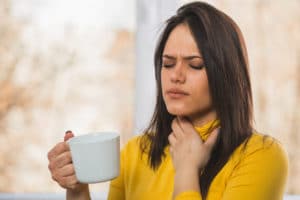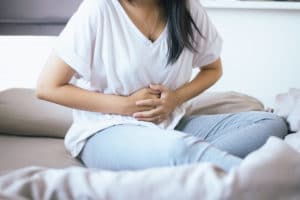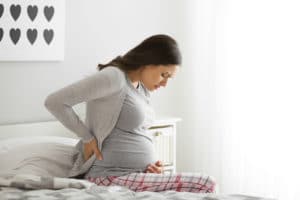In most cases, cramps begin with pain in the calf, explicitly in the calf muscles. In most cases, calf cramps occur at night and cause you to wake up from your well-deserved sleep and not be able to rest for a long time.
What is the reason for this and what helps against calf cramps? Here you can learn how to prevent this common ailment and avoid suffering from calf pain with cramp-like attacks. Calf cramps can occur despite magnesium supplements and are therefore not just a symptom of magnesium deficiency.
There are many causes and accordingly many measures you can take against calf cramps during pregnancy, during sports and at night. Get to the bottom of the cause and try to find out in which situations the muscle cramps occur most often in you.
Table of contents
Calf Cramps – What Is It?
A calf cramp occurs when your muscles in the calf contract. The contraction happens involuntarily and can therefore rarely be directly linked to a situation.
About 40 percent of the population occasionally suffers from cramp-like tensions of the fibula that hurt intensely, but that resolve after a short time. Depending on the cramp, a single muscle or an entire muscle group may be affected.
Mild calf cramps stop after a few minutes, while severe cramps can result in hardening of the muscles and create an unpleasant sensation for several hours, despite the pain subsiding. If you are affected by a calf cramp, your most heartfelt concern is to immediately release the cramp and relax.
In a very few cases, the muscle cramps can extend from the calf to the foot and cause you to be virtually immobile for the duration of the pain.
When Calf Cramps Most Commonly Occur
Most often, calf cramps occur at night. You may also experience calf pain and subsequent cramping while exercising or sitting cross-legged. Often the cramp announces itself a few minutes before it occurs and gives you the opportunity to prevent worse with massages or a counter stretching.
However, this is only possible when you are awake. If your calf cramps occur at night, it is inevitable that you will wake up from the pain and will not be able to go back to sleep until your calf muscles have released themselves from the contraction.
In addition to deficiencies, of which magnesium deficiency is the most common cause of calf cramps, calf pain with cramping contraction of your muscles can also occur due to fluid loss.
Basically, cramps are a warning signal that you should take seriously and get to the bottom of.
Tips Against Calf Cramps After Sports Activities
Muscle cramps are rare during sports. But as soon as your body recovers and you come to rest, you may experience severe pain in the calf? What can you do against calf cramps and how can you get quick relief if a cramp occurs during a break in training?
Stretch your lower leg while standing by pulling your toes up and placing your heel firmly on the ground. At the same time you can gently massage the calf with one hand and try to release the cramp this way.
After loosening your foot, take a few slow steps and take a short break from exercising. Don’t forget to balance your fluids and take in enough electrolytes.
In most cases, you can avoid calf cramps during and after exercise by drinking enough fluids and warming up before an intense workout.
Tips For Cramping Calf Pain At Night
If you wake up at night due to calf cramps, pull your toes up in a lying position. Alternatively, you can stand up and walk a few steps, so that the cramp can be relieved. Cooling helps some sufferers, while others benefit from heat.
Here you have to try which support helps you with calf pain and relieves the cramp. Calf cramps are particularly common during pregnancy.
If you have always suffered from calf pain and have frequent muscle cramps, you will wake up more often during pregnancy and your sleep will be disturbed because the calf cramps will increase at night. Do you have calf cramps that do not get better despite magnesium supplements? Then check your dietary habits and, if in doubt, consult a doctor.
Calf Cramps During Pregnancy? This Helps!
Calf cramps are not uncommon during pregnancy, despite supplemental vitamins. Your risk of calf pain increases because your hormone balance changes and because your body needs a significantly higher amount of minerals.
If your calf cramps increase despite magnesium and other minerals, you should ask your doctor for advice. In most cases, you can relieve calf pain and muscle cramps at night by drinking plenty of fluids and taking supplements to compensate for the increased mineral requirements.
If you have done a lot of sports so far and move less from the second trimester of your pregnancy, the reduced blood flow to the calf muscles can be a reason for cramps.
By cycling, swimming or doing pilates and yoga you can stimulate the blood circulation and protect yourself from pain in the calf and from cramps in the calf muscles.
Calf Cramps Have Different Causes
In most cases, calf cramps are harmless. However, this is of little comfort to you if you are frequently affected by them and your well-being is impaired by cramp-like tensions during sports or at night.
Mineral deficiencies, especially magnesium deficiency, promote muscle cramps in the calves and feet. Too little fluid and an undersupply of electrolytes can also trigger calf cramps at night and cause you to suddenly be plagued by a cramp in your calf, for example, while jogging.
However, there are also some conditions that can be associated with increased calf cramps. Muscle and nerve diseases, diabetes mellitus and thyroid dysfunction affect the calf muscles and result in long-lasting, as well as frequently occurring calf cramps.
If you experience calf cramps despite taking magnesium, drinking enough fluids and without any explainable reason, you should have the cause clarified by a doctor. A comprehensive examination can rule out or diagnose serious illnesses, determine deficiency symptoms and find the reason for cramps and pain in the calf.
Poisoning or side effects of medication can also result in muscle cramps. The side effect “calf cramp” is well known with beta-blockers, cholesterol-lowering drugs and with insulin or the frequent use of asthma sprays.
What helps against calf cramps? If calf cramps become more frequent during pregnancy, an increased intake of minerals usually helps. If your cramps are due to a medical condition, the problem should resolve once you have been diagnosed and started treatment. Calf cramps: What to do if a prescribed medication is the cause?
In this case, it is recommended that you address the attending physician about the problem and ask for a change in medication. Even though calf cramps are a rare side effect with pharmaceuticals, medication use cannot be completely ruled out as a cramp-inducing cause.
Muscle Cramps In The Calf – Different Types
Cramps in the calf muscles always manifest themselves with the same symptoms. First you have slight pain in the calf and the muscles harden. This is followed by the cramp, which can occur in different stages from mild to severe and last for several minutes.
As already mentioned, calf cramps can be based on different causes. In medicine, a subdivision is made into 3 different types\:
- Paraphysiological Cramps
- Idiopathic Cramps
- Symptomatic Cramps
A paraphysiological cramp is due to an imbalance of electrolytes. It occurs when your body lacks magnesium, calcium or sodium. In most cases, the calf pain is temporary, for example, when you overload yourself during sports and rest after the activity.
Paraphysiological muscle cramps can also occur during pregnancy. The cause is based on the lack of electrolytes and is therefore treatable if you balance the electrolyte balance and, for example, take an isotonic drink or supplements with the essential minerals.
Idiopathic calf cramps are unexplained in their cause. They can be the result of a genetic predisposition, but also a symptom of undiagnosed diseases. It is known that severe calf pain and cramps can occur despite magnesium, for example, in diabetes mellitus.
If you suffer from frequent pain in the calf and cannot guess a reason, an examination by a doctor is recommended. Idiopathic calf cramps are usually excluded in pregnancy as temporary muscle cramps.
Symptomatic bouts in the calf muscles occur as an accompanying symptom of intolerance to a drug and in cases of poisoning. They may indicate a disease of the nerves, metabolism or cardiovascular disease and may be caused by muscle weakness with a pathological history.
Only a medical diagnosis will bring clarity, unless you are knowingly ill and are being treated with medication. If the calf cramps occur in conjunction with other symptoms, there could be an underlying poisoning.
Prevention Is Based On The Cause
You can prevent calf cramps, unless they occur as an accompanying symptom of a serious illness, quite easily in most cases. The most common cause is muscle pain caused by a lack of mineral salts, which occurs more frequently in the calf muscles and takes on cramp-like forms.
After sports, after going to the solarium or after a visit to the sauna, you should balance your fluid and electrolyte levels and drink an isotonic drink containing electrolytes. What helps against calf cramps and prevents the problem that calf cramps jerk you out of sleep at night and make you tired and exhausted in the morning?
Here, evening stretching has proven to be a helpful measure. If you stretch your muscles before going to bed, you will usually be spared calf cramps and will be able to sleep through the night completely relaxed.
Calf cramps during pregnancy can be avoided by increasing the magnesium level. Supply your body with sufficient magnesium and use preparations in powder form or as effervescent tablets that are dissolved in a glass of water.
In this way, you also make an important contribution to balancing your fluid balance and avoid forgetting to drink and becoming prone to calf cramps due to fluid loss.
There is no general answer to the question: “What to do about calf cramps? Proper prevention with a chance of success is based on the cause that leads to calf pain and causes your calf muscles to cramp.
General Tips Against Cramps And Pain In The Calf
If you experience muscle cramps very frequently and very severely, you should seek a medical diagnosis. A visit to the doctor is also recommended for pain in the calf that you have never suffered from before and that currently occurs several times a day.
Calf cramps that occur during pregnancy together with shoulder pain are harmless in most cases and are due to the change in hormone balance. Gentle massages help against tension in the shoulder area, which can also be beneficial for pain in the calf.
It is important that you get enough exercise and stretch your muscles. Relaxation of the muscles and stimulation of the blood circulation promote your well-being and reduce the risk of cramp-like tension.
Calf cramps despite magnesium and a generally balanced mineral balance do not end with the intake of additional minerals. In the case of frequent cramps, it has proven useful to keep a kind of diary and write down over the period of a month when, in what intensity and in what context there is pain in the calf.
At the end of the month, in view of the notes, you can find out if the calf cramps occur more often during and after sports, at night or in your eyes completely unpredictably and without a fixed pattern.
The notes can also be helpful if you have the reason for muscle cramps medically diagnosed. Yoga and Pilates have been shown to work for many sufferers. Well-stretched muscles cramp much less often and are your chance to end the suffering and no longer be jolted out of sleep at night or interrupted during sports by calf cramps.
Why Calf Cramps Usually Occur In The Same Leg
There is no researched reason why calf cramps always occur in the same leg in many sufferers. A cause could be found in the one-sided load or in the overloading of the standing leg. If the calf cramps occur at night, a change in the sleeping position bring relief.
Do you often lie on your right side and wake up because your calf hurts on the right? Then try to see if the calf cramps still occur when you sleep on your left side or if the problem is solved by changing your position. Your muscles should relax during sleep.
If you sleep with your legs tucked in and put weight on one leg through the second leg above it, the lying position can lead to a temporary reduction in blood flow and thus to calf cramps.
What helps against calf cramps that occur unilaterally with a recurring pattern? If you want to do something about calf cramps, first try to avoid the cramp-triggering situation.
When Should You Go To The Doctor With A Calf Cramp?
Most calf cramps are harmless, even if the calf pain is severe. You should consult a doctor if the cramp-like conditions become more frequent and if your calf muscles are still hardened and tense the following day.
If you cannot alleviate the condition with massages and stretching exercises, it could be due to a serious illness and should be diagnosed as soon as possible.
Calf cramps that occur in conjunction with numbness, a prolonged tingling sensation in the leg or with restrictions in movement require clarification of the cause.
If the calf cramps occur frequently or even daily despite magnesium and an adequate fluid intake, a diagnosis can be the basis for a pain-free life.
Magnesium Deficiency – A Major Cause Of Calf Cramps
Magnesium controls nerve function and is an important building block for your muscles. If the mineral balance is disturbed over a longer period of time, the reason for your calf pain can be found in this circumstance.
In case of an acute deficiency, muscle cramps can occur in the arms, in the feet and also in the back muscles or in the abdominal muscles. Your nervous system is more excitable with mineral deficiencies and therefore more susceptible to tension, which eventually leads to a cramp and results in frequent pain in the calf.
In this case, you can easily remedy the situation by reviewing your drinking habits and deciding to balance the mineral content with supplements or dissolvable magnesium preparations.
Hormonal Contraceptives Cause Cramps In The Calves
If you use the contraceptive pill, cramps in the calves are a possible side effect. You can read on the package insert that hormonal contraception can cause pain in the calves and muscle cramps.
The pill changes your hormonal balance and can lead to magnesium deficiency and circulatory disorders. Since it also increases the risk of thrombosis, you should keep a close eye on your body and discuss frequent calf cramps with your gynecologist.
When taking the pill, muscle cramps can be an early warning system of your body and announce a thrombosis. Therefore, it is advisable not to wait too long to see a doctor in this case, in order to avoid a serious illness.
In the case of mild or rather infrequently occurring cramps of the calf muscles, it is usually sufficient if you drink more and supply your body with additional magnesium. If the calf cramps do not improve despite magnesium and increased fluid intake, it is important to have your blood clotting checked.
Your doctor can thrombosis and treat it early so that a life-threatening blood clotting disorder with clot formation in the legs does not occur in the first place.
Temporary And Recurrent Calf Cramps Are Signals From The Body
Calf cramps during pregnancy allow you to assign the cause yourself. If you suffer from calf pain while taking the pill and suspect a connection, the visit to the doctor should not be postponed for long.
If muscle struggles occur in the calves and feet during or after sports, it may be a consequence of insufficient fluid and electrolyte intake. After a party with increased alcohol consumption, calf cramps are just as common as the proverbial hangover, which indicates a fluid deficit and a lack of salts in your body.
Basically, your body wants to tell you something through cramps in the calf muscles and indicate a deficit or a disease. If you are careful with yourself and feel whether the calf pain is accompanied by other symptoms, you will act correctly and can take preventive measures.
What helps against calf cramps and what can you do against calf cramps? Keep calm, don’t put yourself under stress and look carefully at your lifestyle and eating habits.
In most cases, this way you will find the cause and realize why the calf cramps have become more frequent lately and why you did not have pain in the calf before. Your body is telling you something through calf pain that you should pay attention to and stop.
Conclusion: Painful But Mostly Harmless – When The Calf Muscles Cramp
Most often, calf cramps occur at night or after sports. Calf cramps during pregnancy are also not a cause for concern, but are completely normal in the majority of all women due to the change in hormone levels.
If the calf cramps do not improve or even get worse despite magnesium and the recommended stretching exercises, a clarification by the doctor is necessary.
Before you worry about your health and suspect a disease, you can usually provide relief with an increased fluid intake and the balance of your electrolyte balance. Massage the affected calf and slowly massage out the tension.











